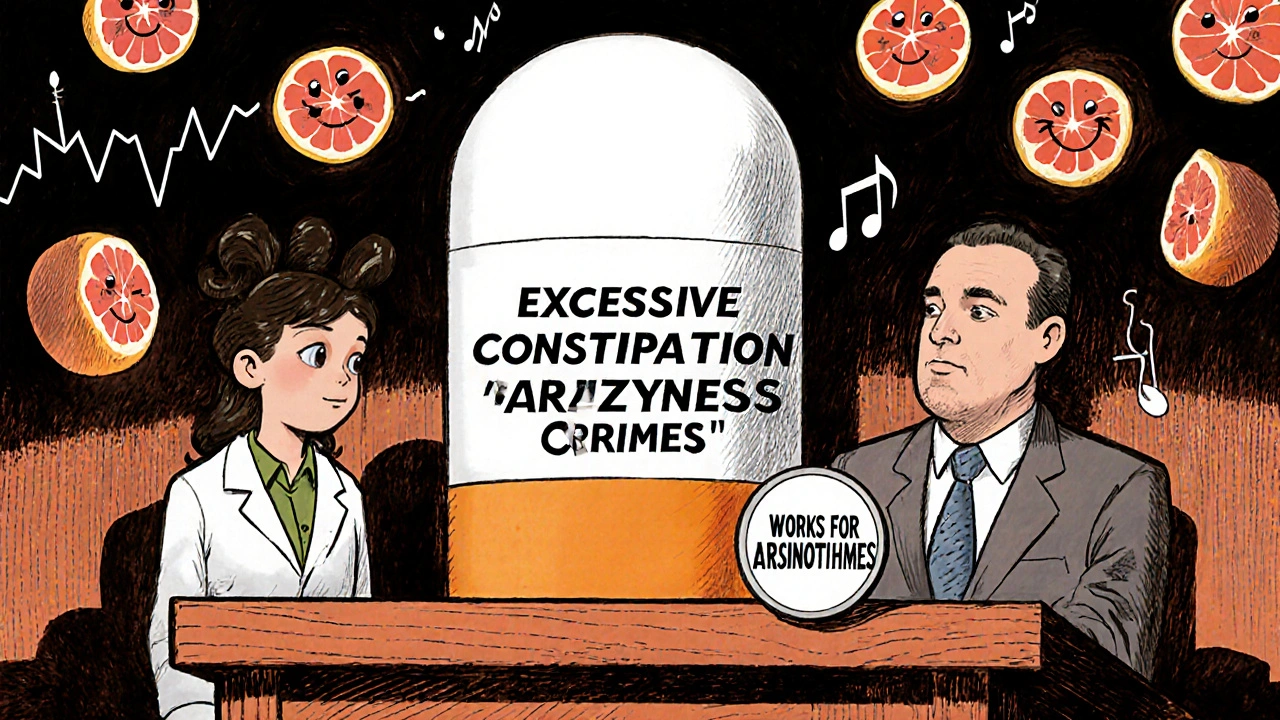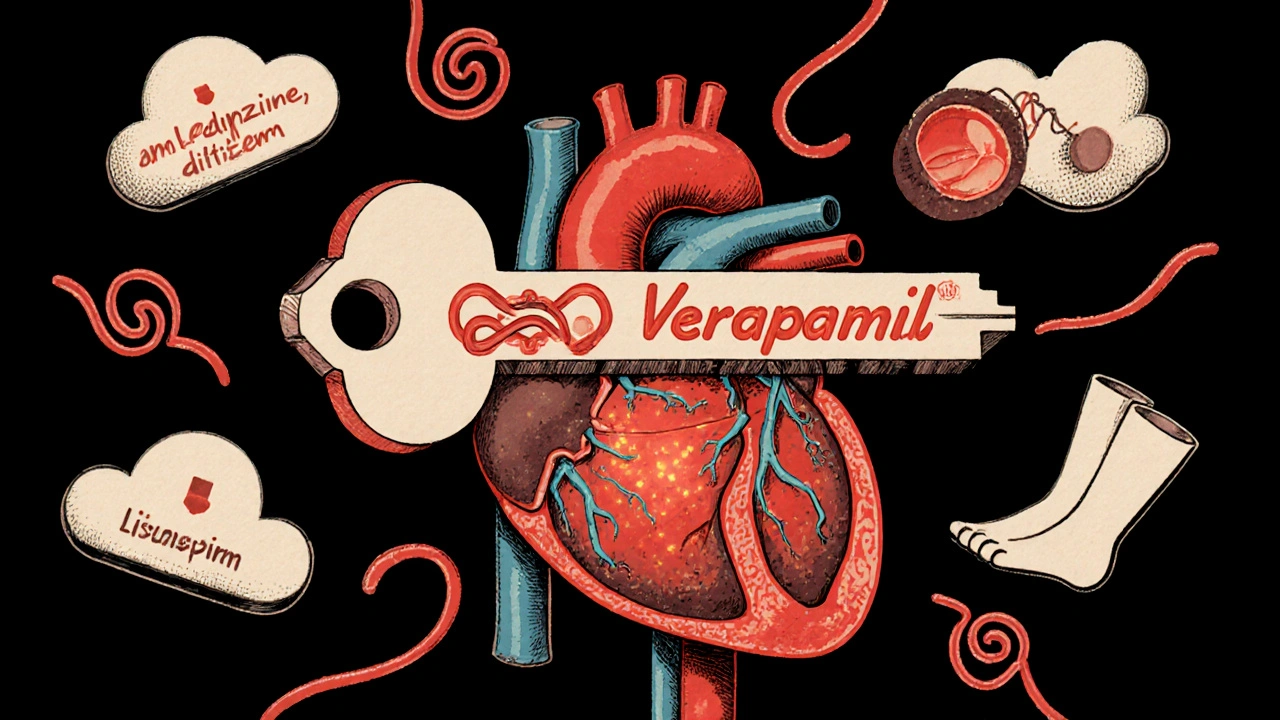High Blood Pressure & Angina Medication Comparison Tool
Find the Best Medication for You
Select your main condition and concerns to see which medication might work best for you.
Your Recommended Medication
When your doctor prescribes Calan (Verapamil) for high blood pressure or chest pain, it’s not the only option on the table. Many people wonder: Is there something better? Safer? Cheaper? Or maybe one that doesn’t make me feel dizzy or constipated? The truth is, Verapamil works well for many - but it’s not the right fit for everyone. And there are several other medications that do similar jobs, sometimes with fewer side effects or better results for your specific condition.
What Calan (Verapamil) Actually Does
Calan is the brand name for Verapamil, a calcium channel blocker. It stops calcium from entering heart and blood vessel cells. That relaxation of blood vessels lowers blood pressure and reduces how hard your heart has to work. It’s commonly used for three things: treating high blood pressure (hypertension), controlling chest pain (angina), and managing certain irregular heartbeats like atrial fibrillation.
Verapamil comes in immediate-release tablets (taken 3-4 times a day) and extended-release versions (once or twice daily). The extended-release form is more common now because it’s easier to stick with. But even then, side effects like constipation, dizziness, swelling in the ankles, and fatigue happen in up to 20% of users. For some, these aren’t just annoying - they’re enough to stop taking the drug.
Why People Look for Alternatives
People switch from Verapamil for a few real reasons:
- Constipation gets worse over time and doesn’t improve
- Dizziness makes driving or working unsafe
- They have heart failure - Verapamil can make it worse
- They’re on other meds that interact badly (like beta-blockers or statins)
- They need something cheaper - Verapamil isn’t always the most affordable
And let’s be honest: if you’ve been on the same pill for months and still feel tired all the time, you’re going to ask your doctor about other choices. That’s normal. You’re not giving up - you’re trying to find the right fit.
Top Alternatives to Calan (Verapamil)
There are three main classes of drugs that can replace Verapamil, depending on your condition:
1. Amlodipine (Norvasc)
One of the most common replacements. Amlodipine is also a calcium channel blocker, but it works mostly on blood vessels, not the heart. That means less risk of slowing your heart rate too much. It’s often better for older adults and people with isolated high blood pressure.
Side effects? Swelling in the legs and feet is common - but constipation? Rare. A 2023 study in the Journal of Clinical Hypertension found patients on amlodipine were 35% more likely to stick with their medication than those on Verapamil because of fewer digestive issues.
2. Diltiazem (Cardizem, Tiazac)
This is another calcium channel blocker, very similar to Verapamil. But diltiazem has a slightly different effect on the heart. It’s often preferred for people with atrial fibrillation because it controls heart rate more predictably.
It’s also available in extended-release forms, just like Verapamil. The big difference? Diltiazem causes less constipation than Verapamil - about half the rate in clinical trials. But it can still cause dizziness and low blood pressure. If you’re already on beta-blockers, combining them with diltiazem can be risky.
3. Lisinopril (Zestril, Prinivil)
Lisinopril is an ACE inhibitor, not a calcium channel blocker. It works by relaxing blood vessels through a different pathway - blocking a hormone that narrows them. It’s often used as a first-line treatment for high blood pressure, especially if you have diabetes or kidney disease.
Side effects? A dry cough affects about 10% of users. Some people get a strange metallic taste. But no constipation. No dizziness from heart rate drops. And it’s usually cheaper than Verapamil, especially in generic form.
4. Metoprolol (Lopressor, Toprol XL)
Metoprolol is a beta-blocker. It slows your heart rate and lowers blood pressure by blocking adrenaline. It’s great for people with angina, heart rhythm issues, or a history of heart attack.
Unlike Verapamil, it doesn’t cause constipation. But it can make you feel tired, cold, or even depressed. It’s not ideal if you have asthma or severe circulation problems in your legs. Also, if you’re diabetic, it can hide low blood sugar symptoms.
5. Hydrochlorothiazide (HCTZ)
This is a diuretic - a water pill. It helps your kidneys flush out extra salt and water, which lowers blood pressure. It’s often combined with other drugs, but it can work alone for mild hypertension.
It’s one of the cheapest options. Side effects include frequent urination, low potassium, and dizziness when standing up. It doesn’t help with angina or heart rhythm problems, so it’s not a full replacement for Verapamil if you have those conditions.

Comparison Table: Verapamil vs. Top Alternatives
| Medication | Class | Best For | Common Side Effects | Constipation Risk | Cost (30-day generic) |
|---|---|---|---|---|---|
| Verapamil (Calan) Calcium channel blocker used for high blood pressure, angina, and arrhythmias | Calcium Channel Blocker | High blood pressure, angina, atrial fibrillation | Dizziness, constipation, fatigue, swelling | High | $15-$30 |
| Amlodipine (Norvasc) Calcium channel blocker focused on blood vessel relaxation | Calcium Channel Blocker | High blood pressure, especially in older adults | Swelling in legs, flushing, dizziness | Low | $5-$15 |
| Diltiazem (Cardizem) Calcium channel blocker with strong heart rate control | Calcium Channel Blocker | Atrial fibrillation, angina | Dizziness, headache, nausea | Moderate | $10-$25 |
| Lisinopril (Zestril) ACE inhibitor that relaxes blood vessels by blocking hormones | ACE Inhibitor | High blood pressure, diabetes, kidney protection | Dry cough, taste changes, low blood pressure | None | $4-$12 |
| Metoprolol (Toprol XL) Beta-blocker that reduces heart rate and workload | Beta-Blocker | Angina, post-heart attack, arrhythmias | Fatigue, cold hands, depression, low blood sugar masking | None | $10-$20 |
| Hydrochlorothiazide (HCTZ) Diuretic that removes excess fluid | Diuretic | Mild hypertension, often combined with other drugs | Frequent urination, low potassium, dizziness | None | $3-$10 |
Which Alternative Is Right for You?
There’s no one-size-fits-all answer. Your best choice depends on your health history and what you’re trying to control.
- If you have high blood pressure only and hate constipation → Amlodipine or Lisinopril are top picks.
- If you have atrial fibrillation → Diltiazem often works better than Verapamil.
- If you’ve had a heart attack or have angina → Metoprolol may offer better protection.
- If you have diabetes or kidney disease → Lisinopril is often preferred because it protects your kidneys.
- If you need the cheapest option and have mild hypertension → HCTZ can work, but usually needs to be paired with another drug.
One thing to remember: switching meds isn’t instant. It can take 2-4 weeks for your body to adjust. Don’t stop Verapamil on your own. Your doctor will likely taper you off slowly and start the new drug gradually to avoid blood pressure spikes or heart rhythm problems.
What About Natural Alternatives?
You might hear about magnesium, garlic, or beetroot juice lowering blood pressure. Some studies show modest effects - but they’re not replacements for prescribed medication.
For example, magnesium supplements might help a little if you’re deficient, but they won’t match Verapamil’s ability to control heart rhythm. Beetroot juice can lower systolic pressure by 5-10 mmHg - useful as a bonus, not a solution.
Don’t swap your pill for a supplement without talking to your doctor. Some natural products (like St. John’s Wort or grapefruit juice) can interfere dangerously with Verapamil and its alternatives.

When to Stick With Verapamil
Even with all these alternatives, Verapamil still has its place. You might want to keep it if:
- You’ve been on it for years and feel fine - no side effects
- You have a specific heart rhythm problem that responds best to Verapamil
- Your doctor has tried other drugs and they didn’t work
- You’re not experiencing constipation or dizziness
There’s no shame in staying on a drug that works. The goal isn’t to switch for the sake of change - it’s to find the safest, most effective treatment for your body.
Questions to Ask Your Doctor
Before you decide on a switch, bring up these questions:
- Why did you pick Verapamil for me originally?
- What side effects should I watch for with the alternative?
- Will this new drug interact with my other medications?
- How long should I wait to see if it’s working?
- Is there a generic version? How much will it cost?
Write down your symptoms - like how often you feel dizzy, whether your legs swell, or if you’re skipping doses because of constipation. That kind of detail helps your doctor make a smarter call.
Is Verapamil better than amlodipine for high blood pressure?
Neither is universally better - it depends on your body. Amlodipine is often preferred because it causes less constipation and is cheaper. Verapamil may be better if you also have a fast or irregular heartbeat. Studies show amlodipine lowers blood pressure just as well, with fewer people stopping treatment due to side effects.
Can I switch from Calan to diltiazem on my own?
No. Switching between calcium channel blockers requires medical supervision. Stopping Verapamil suddenly can cause rebound high blood pressure or chest pain. Your doctor will slowly reduce your dose while introducing diltiazem to avoid dangerous spikes.
Does Verapamil cause weight gain?
Verapamil doesn’t directly cause weight gain. But fluid retention (swelling in ankles or feet) can make you feel heavier. If you notice sudden weight gain - more than 2-3 pounds in a few days - tell your doctor. It could mean your heart isn’t pumping well enough, or the drug isn’t the right fit.
Are there any foods I should avoid with Verapamil or its alternatives?
Yes. Grapefruit and grapefruit juice can interfere with Verapamil, diltiazem, and amlodipine, making them stronger and increasing side effects. Avoid them completely. Also, limit alcohol - it can lower your blood pressure too much when combined with these drugs.
What’s the safest long-term blood pressure medication?
There’s no single "safest" - it depends on your health. For most people without other conditions, amlodipine or lisinopril are preferred for long-term use because of their strong safety record, low cost, and minimal side effects. Verapamil is safe too, if you tolerate it well. Regular checkups and blood tests are more important than the specific drug you take.
Next Steps: What to Do Now
If you’re thinking about switching from Calan:
- Write down your top 3 side effects or concerns with Verapamil.
- Check your current prescription cost - is it affordable?
- Make a list of all other medications and supplements you take.
- Book an appointment with your doctor or pharmacist. Bring your list.
- Ask: "What’s the most effective alternative with the fewest side effects for me?"
Don’t wait until you’re miserable to speak up. Your treatment should help you live better - not make you feel worse. The right medication isn’t about what’s popular or cheapest. It’s about what works for you.

Steve Dressler
November 1, 2025 AT 20:11Verapamil wrecked my gut for months. Switched to amlodipine and suddenly I could eat broccoli again without regret. Also cheaper. My pharmacist said it’s the new first-line for older folks - no joke.
Carl Lyday
November 2, 2025 AT 00:25I’ve been on lisinopril for 8 years now - no constipation, no dizziness, just steady BP control. My kidneys are happy too since I’m diabetic. The dry cough? Yeah, it’s annoying, but I gargle salt water and it fades after a week. Worth it. If you’re on Verapamil and constipated, ask for ACEi first. It’s not magic, but it’s low-key life-changing.
Also, grapefruit juice is a silent saboteur. I learned that the hard way after my BP spiked to 190/110. Don’t be me.
Tom Hansen
November 3, 2025 AT 18:15Donna Hinkson
November 3, 2025 AT 19:34I switched to diltiazem after Verapamil gave me constant dizziness. It’s not perfect - I still get headaches - but the constipation vanished. I appreciate how thorough this post is. It’s rare to find info that doesn’t feel like a drug ad.
Rachel M. Repass
November 5, 2025 AT 12:00Let’s not romanticize the ‘cheaper’ meds. HCTZ isn’t a ‘solution’ - it’s a bandaid with electrolyte roulette. And yes, lisinopril’s cough is a classic ACEi side effect, but here’s the deeper truth: the body doesn’t ‘adapt’ to these drugs - it negotiates with them. We’re not just treating BP; we’re negotiating cellular signaling pathways with synthetic molecules that mimic or block endogenous hormones.
Metoprolol? It’s a beta-adrenergic antagonist that reduces myocardial oxygen demand - great for post-MI, but if you’re depressed or sedentary, it’ll bury you. Amlodipine? Vasodilation via L-type calcium channel blockade. Clean. Predictable. But if you have PAD? Watch the edema.
Verapamil’s niche? It’s the only CCB that modulates AV node conduction. So if you’ve got AFib with RVR, it’s still king. But if you’re just hypertensive? You’re probably better off with an ARB or even a thiazide + ACE combo. The goal isn’t to ‘find the right pill’ - it’s to find the right physiological profile for your phenotype. And yes - grapefruit juice is a CYP3A4 inhibitor. Don’t be a statistic.
Arthur Coles
November 7, 2025 AT 07:05Who funds these studies? Pharma. Amlodipine is cheaper? Yeah, because it’s been generic for 15 years. But did you know Verapamil was originally derived from a plant used in traditional Chinese medicine? The ‘side effects’ they list? That’s just the tip. The real danger is long-term vascular remodeling from calcium blockade - they don’t tell you that in the pamphlet.
And why is no one talking about the 2018 FDA alert on calcium channel blockers and breast cancer risk? Google it. They buried it under ‘insufficient evidence.’
Meanwhile, your ‘natural alternatives’? Magnesium? That’s what they used in the 1950s before Big Pharma took over. The system is rigged. Stay vigilant.
Kristen Magnes
November 8, 2025 AT 03:29If you’re thinking about switching - DO IT. But don’t just quit Verapamil. Talk to your doctor. Bring this post. Write down your symptoms. I was terrified to speak up too - until I realized my doctor doesn’t know how bad the constipation was until I said, ‘I haven’t had a normal bowel movement in 3 weeks.’
You’re not being dramatic. You’re being smart. Your body is trying to tell you something. Listen. And if your doctor brushes you off? Get a second opinion. You deserve to feel good, not just ‘less bad.’
Also - grapefruit juice is not your friend. I learned that the hard way. Don’t be me.
adam hector
November 8, 2025 AT 15:40Everyone’s talking about drugs like they’re the answer. But here’s the truth nobody wants to admit: high blood pressure isn’t a disease - it’s a symptom of a broken lifestyle. You take a pill to silence the alarm… but never fix the fire.
Verapamil? Amlodipine? Lisinopril? They’re all just chemical bandaids. Real change? It’s sleep. It’s sodium. It’s stress. It’s walking 10k steps a day. It’s quitting processed food.
Why do you think Japan has the lowest hypertension rates? Not because they take better pills. Because they eat fish, fermented veggies, and sit in silence for 20 minutes a day.
So yes - switch meds if you need to. But ask yourself: are you treating the symptom… or the soul?